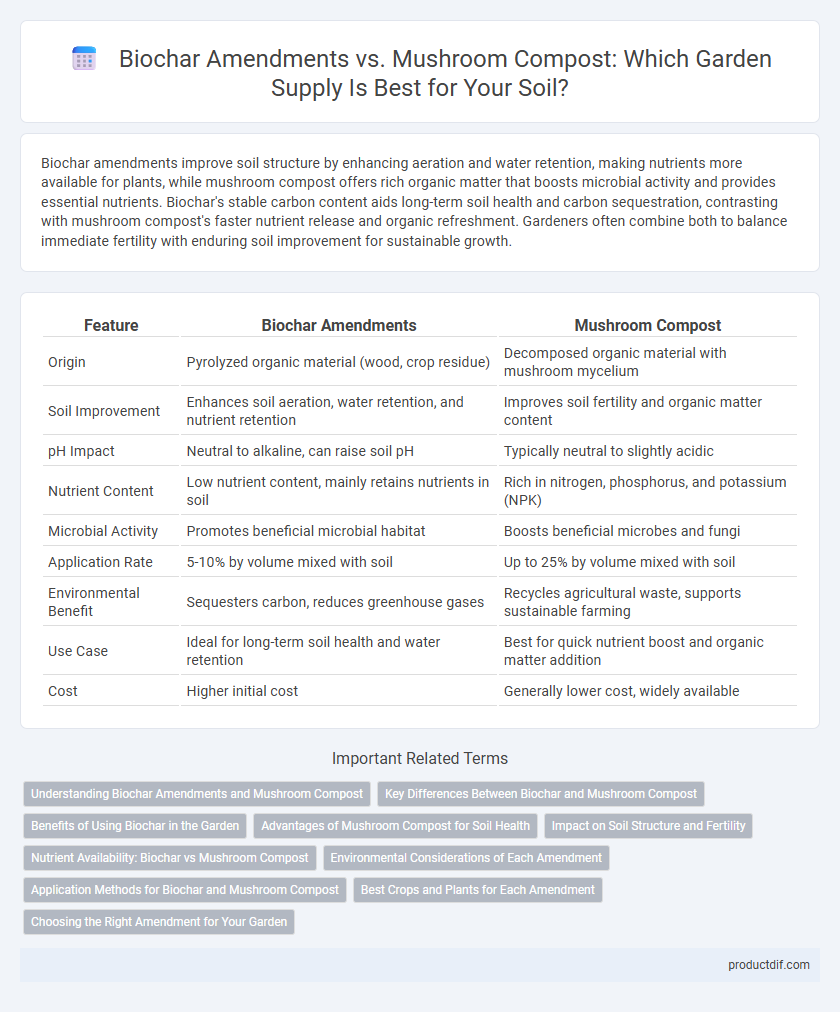Biochar amendments improve soil structure by enhancing aeration and water retention, making nutrients more available for plants, while mushroom compost offers rich organic matter that boosts microbial activity and provides essential nutrients. Biochar's stable carbon content aids long-term soil health and carbon sequestration, contrasting with mushroom compost's faster nutrient release and organic refreshment. Gardeners often combine both to balance immediate fertility with enduring soil improvement for sustainable growth.
Table of Comparison
| Feature | Biochar Amendments | Mushroom Compost |
|---|---|---|
| Origin | Pyrolyzed organic material (wood, crop residue) | Decomposed organic material with mushroom mycelium |
| Soil Improvement | Enhances soil aeration, water retention, and nutrient retention | Improves soil fertility and organic matter content |
| pH Impact | Neutral to alkaline, can raise soil pH | Typically neutral to slightly acidic |
| Nutrient Content | Low nutrient content, mainly retains nutrients in soil | Rich in nitrogen, phosphorus, and potassium (NPK) |
| Microbial Activity | Promotes beneficial microbial habitat | Boosts beneficial microbes and fungi |
| Application Rate | 5-10% by volume mixed with soil | Up to 25% by volume mixed with soil |
| Environmental Benefit | Sequesters carbon, reduces greenhouse gases | Recycles agricultural waste, supports sustainable farming |
| Use Case | Ideal for long-term soil health and water retention | Best for quick nutrient boost and organic matter addition |
| Cost | Higher initial cost | Generally lower cost, widely available |
Understanding Biochar Amendments and Mushroom Compost
Biochar amendments improve soil structure and water retention by adding stable carbon that enhances microbial activity, while mushroom compost provides rich organic matter high in nitrogen and nutrients for plant growth. Biochar's porous nature promotes soil aeration and long-term fertility, contrasting with the nutrient-release profile of mushroom compost, which decomposes more rapidly. Both materials enhance soil quality but serve distinct roles in supporting sustainable garden ecosystems.
Key Differences Between Biochar and Mushroom Compost
Biochar amendments consist of carbon-rich, porous material produced through pyrolysis of organic biomass, enhancing soil aeration, water retention, and long-term carbon sequestration. Mushroom compost, derived from decomposed agricultural wastes and mushroom substrates, primarily offers nutrient-rich organic matter that rapidly improves soil fertility and microbial activity. Key differences lie in biochar's durability and ability to modify soil structure versus mushroom compost's nutrient content and faster decomposition rate.
Benefits of Using Biochar in the Garden
Biochar amendments improve soil structure by enhancing aeration and water retention, promoting robust root growth in garden plants. Its high carbon content supports beneficial microbial activity, leading to increased nutrient availability and reduced fertilizer runoff. Biochar's long-lasting stability enriches soil fertility over time, making it a sustainable alternative to mushroom compost for sustainable gardening.
Advantages of Mushroom Compost for Soil Health
Mushroom compost enhances soil health by improving nutrient content, increasing organic matter, and promoting beneficial microbial activity, which supports plant growth. Its high levels of calcium, nitrogen, and trace minerals help balance soil pH and boost soil fertility more effectively than many other organic amendments. Additionally, mushroom compost's moisture retention properties reduce irrigation needs while improving soil structure and aeration.
Impact on Soil Structure and Fertility
Biochar amendments enhance soil structure by increasing porosity and water retention, promoting aeration and microbial activity essential for nutrient cycling. Mushroom compost contributes rich organic matter and nutrients, improving soil fertility by boosting microbial populations and providing slow-release nitrogen. Both amendments improve soil health, but biochar significantly enhances long-term soil stability while mushroom compost accelerates nutrient availability.
Nutrient Availability: Biochar vs Mushroom Compost
Biochar amendments enhance soil nutrient retention by increasing cation exchange capacity, allowing for prolonged nutrient availability and improved plant uptake. Mushroom compost provides a rich source of readily available nutrients, particularly nitrogen, phosphorus, and potassium, which rapidly support plant growth. Combining biochar with mushroom compost can optimize nutrient availability by stabilizing organic matter and sustaining gradual nutrient release.
Environmental Considerations of Each Amendment
Biochar amendments enhance soil carbon sequestration by stabilizing organic matter, reducing greenhouse gas emissions, and improving soil structure. Mushroom compost contributes to nutrient cycling and organic matter enrichment but may release more nitrogen as nitrous oxide, a potent greenhouse gas, during decomposition. Selecting biochar over mushroom compost can lead to longer-lasting environmental benefits through improved soil health and reduced carbon footprint.
Application Methods for Biochar and Mushroom Compost
Biochar amendments are typically applied by mixing directly into the soil at depths of 6 to 8 inches to enhance soil aeration, water retention, and microbial activity, often requiring pre-charging with nutrients for optimal results. Mushroom compost is usually spread as a top dressing or incorporated into the top 3 to 4 inches of soil to improve organic matter content, soil structure, and nutrient availability, particularly benefiting vegetable beds and flower gardens. Both biochar and mushroom compost benefit from integration during soil preparation phases to maximize soil fertility and plant growth potential.
Best Crops and Plants for Each Amendment
Biochar amendments enhance soil fertility and water retention, making them ideal for crops like tomatoes, peppers, and leafy greens that require consistent moisture and nutrient availability. Mushroom compost is rich in organic matter and nutrients, supporting vigorous growth in root vegetables, flowers, and fruiting plants such as cucumbers and melons. Selecting the appropriate amendment based on crop nutrient needs and soil conditions maximizes plant health and yield.
Choosing the Right Amendment for Your Garden
Biochar amendments enhance soil structure, increase water retention, and promote beneficial microbial activity, making them ideal for improving soil fertility and long-term carbon sequestration. Mushroom compost provides a rich source of organic matter and nutrients, boosting soil nutrient content and supporting rapid plant growth, especially for vegetable and flower gardens. Selecting the right amendment depends on your soil's current condition and crop needs, with biochar suited for soil revitalization and mushroom compost optimal for nutrient enrichment.
Biochar Amendments vs Mushroom Compost Infographic

 productdif.com
productdif.com